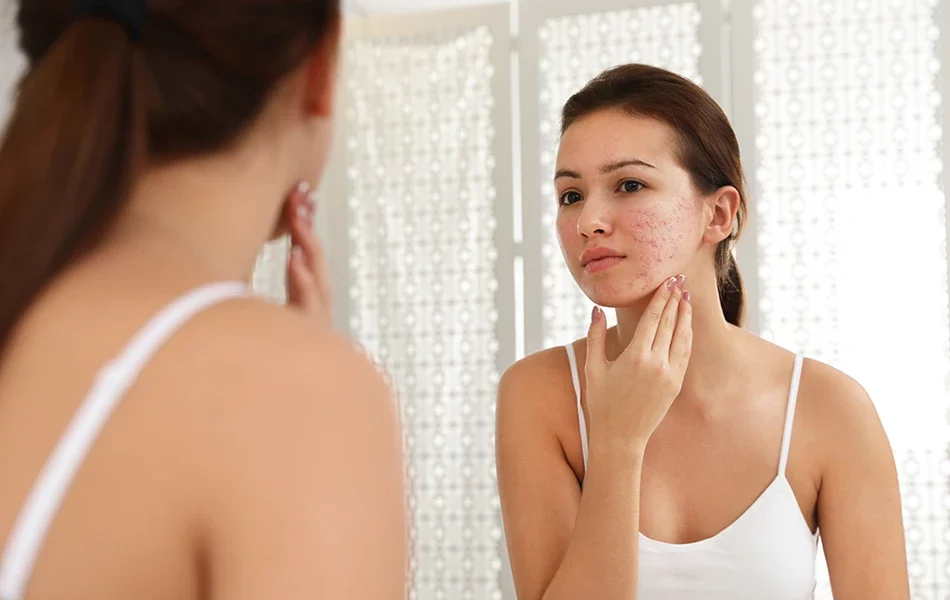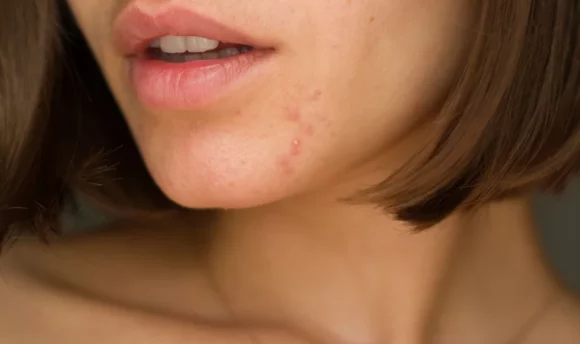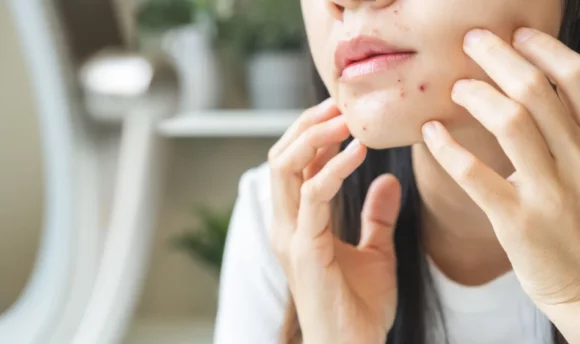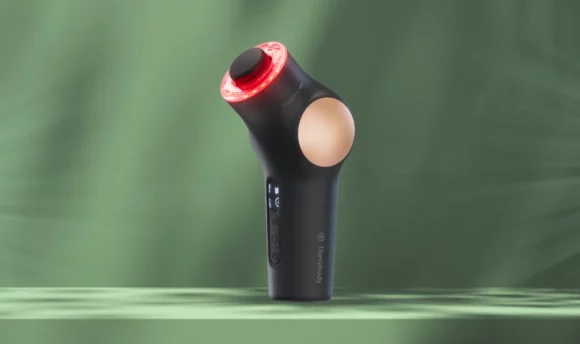How to Remove Acne Scars Naturally: 10+ Remedies for Flawless Skin
Acne scars can appear on the face and other body parts like the chest and back. They serve as an unwelcome reminder of a distressing condition for some people, so can you get rid of acne scars naturally?

Acne is a common skin condition that can leave its mark long after it’s gone. Different people are affected differently by the oily skin, pimples, blemishes, and breakouts associated with acne, and for most people, the effects are temporary. However, in some cases, there can be scarring.
Your body forms scar tissue in an attempt to heal wounds. Anyone who suffers from scarring is looking for a solution. It’s natural to want it all to go away, whether it’s scarring from different types of acne, residual dark spots, or damage from acne lesions.
Acne scars can cause a lot of emotional distress, especially in teenagers. However, there are certain natural remedies and medical treatments that can lighten the appearance of acne scars and pimple marks. Read on to find out 11 home remedies to get rid of acne scars.
How to Remove Acne Scars Naturally?
There are several at-home treatments that can help make acne scars look less noticeable. However, these remedies may not work for all skin types.
Natural (DIY recipes and home remedies), over-the-counter options (such as scar gels, topical retinoids, etc.), and prescription treatments (cosmetic procedures) are available for treating acne and minimizing the visibility of scars. Options vary depending on the type and degree of scarring.
Inflammation can lead to certain acne scars that require medical attention. Home remedies won’t work for them. If this applies to your acne scars, talk to a doctor.
Types of Acne Scars
If you want to remove an old acne scar, you need to know what a scar is and what kind you’re dealing with. Acne scars form when the healing process either creates too much or too little collagen to replace what was present before you had the blemish.
There are 3 types of acne scars:
- Atrophic scars appear as small indentations in the skin. They form when the skin does not produce enough fibroblasts in the healing process. These cells, called fibroblasts, are essential for the creation of collagen and wound healing.
Atrophic scars can be further sub-typed into ice pick scars (narrow, deep, vertical invaginations in the skin) and rolling scars (occur due to abnormal connections between normal-looking skin cells and give skin a rolling or wavy appearance).
- Hypertrophic scars develop when the skin overproduces fibroblasts during the healing process of the acne lesion, resulting in a raised scar.
- Keloid scars, while resembling hypertrophic scars, are typically larger than the initial acne spot. They are frequently hyperpigmented, which makes them darker than the surrounding skin. They might be brown or red. There could also be soreness or itching.
11 Home Remedies for Acne Scars
Many scars become lighter on their own over time. Here are some natural remedies that can help you in this process.
#1 Black seed oil
Black cumin seed oil, also known as Nigella sativa, is native to Europe, Asia, and the Middle East. It has antibacterial, antioxidant, and healing effects on the skin.
Black seed oil can contribute to the repair of skin damage in conditions like psoriasis, rosacea and in the prevention of acne scars. You can use it as a carrier oil directly on the skin and leave it overnight. Or mix a few drops in your favorite facial oil, massage, and then leave overnight.
#2 Rosehip oil
Rosehip oil is derived from the fruits of the rose plant. It has antioxidant and anti-inflammatory properties as it contains vitamin C and fatty acids like linoleic acid and oleic acid. These are beneficial in wound healing.
Studies suggest that it can reduce the appearance of acne scars and even post-surgical scars, giving you clearer-looking skin. Not only in scarring, but pure rosehip seed oil can help reduce active inflammatory acne as well. Ironically, this oil can make your skin less oily.
Rosehip oil is available as an essential oil in the market or online. You can apply it directly to your skin twice daily until you start noticing results. This can take around 6–12 weeks of daily usage.
#3 Honey
Honey has been used in folk medicine since ancient times as it possesses antibacterial and anti-inflammatory properties. The moisture content of honey is one of its most important characteristics, as it is a popular hydrating agent.
For millennia, honey has been recognized as a substance that can promote wound healing and prevent scarring. Its numerous benefits can possibly be taken advantage of for scaffolding uses in tissue repair and developing acne scars.
Honey can be used alone or together with other ingredients like cinnamon or turmeric to make a face mask. Leave on for 20 minutes and then wash off using plain water.
#4 Aloe vera
Aloe vera helps lessen acne scarring by lowering hyperpigmentation, boosting immunity, and acting as an anti-inflammatory agent. Aloe vera has been found to have some positive effects on wound healing. However, it is unclear how it works at different phases of the healing process.
You can obtain aloe vera gel by cutting an aloe vera leaf from the plant or buying it in a jar from a drug store. Apply it directly to the skin and leave it overnight. You have to be consistent to see the skin barrier repair effects of aloe vera.
#5 Shea butter
Shea butter has long been considered a top-notch natural treatment for many skin-related disorders. Originating in West Africa, it is known to reduce acne scars, stretch marks, redness, swelling, pimples, and other skin-related concerns.
Shea butter softens the tissue and eliminates keloids, which may make it effective for treating acne scars. You can use pure shea butter directly on the skin or make a DIY recipe with it by adding a few drops of essential oils (lavender, for example). Apply daily to see results.
#6 Turmeric powder
Turmeric is one of the oldest and most popular spices for skin treatment. According to studies, its topical treatment can improve skin diseases like psoriasis and acne. One study suggests that it is effective in faster healing of cesarean scars.
The curcumin in turmeric reduces the excess melanin production addressing the hyperpigmentation in scars, and gives you radiant skin. Mix turmeric powder in a honey or yogurt base, leave on for 20 min, then rinse with water. Be aware that turmeric can give a temporary yellowish tint to the skin.
#7 Apple cider vinegar
The acne-causing bacteria Propionibacterium acnes can be eliminated by the acetic acid, succinic acid, and citric acid found in apple cider vinegar. Studies have shown that lactic acid can reduce acne when applied to the face. However, there’s no scientific evidence directly relating to apple cider vinegar.
Mix 1 part apple cider vinegar with 3 parts water, and apply it using a cotton ball or a Q-tip. Leave on for 10–15 minutes and then rinse off. Do this once or twice a day.
#8 Tea tree oil
It has been shown in a study that using tea tree oil on hypertrophic acne scars can lessen their appearance. Therefore, this might be viewed as a type of support to other medical therapies in the treatment of acne scars.
You can use it directly on the skin in diluted form as a spot treatment. Or mix it with a carrier oil like jojoba, rosehip, etc.
#9 Baking soda
Baking soda is known to be a mild exfoliant. Although there are no studies or scientific evidence yet, baking soda can soothe your skin and remove dead skin cells. It can relieve minor pain, itchiness, redness, and irritation.
Make a paste by adding baking soda to water-a little at a time. Apply it onto the affected skin, and rinse off after 20 minutes.
#10 Lemon
It is unclear whether lemon products can specifically affect acne scarring. However, lemon has natural skin-brightening properties that may help treat acne scars because it contains vitamin C and citric acid.
Squeeze a few drops of lemon juice into rose water or cucumber juice and apply to the face. Leave it on until it dries, and then wash your face with plain water. This remedy will not help with raised or pitted scars, but it can help lighten hyperpigmentation.
#11 Coconut oil
Due to its moisturizing and antibacterial properties, some people have started using coconut oil to treat acne scarring. However, coconut oil is high in the comedogenic index, meaning that it can clog pores and make acne worse.
Therefore, coconut oil is not recommended to reduce acne scars in people having very oily or sensitive skin.
Other acne scar treatment strategies
For deep and stubborn scars, you can certainly look into cosmetic procedures that can be done in a doctor’s office. Here’s a list of possible options:
- Microneedling: This involves puncturing thousands of tiny little holes in the skin that stimulates collagen production in the skin.
- Laser treatment: Laser therapy targets the blood vessels underneath the scar tissue.
- Chemical peels: This involves the use of abrasive agents to remove the topmost layer of skin, revealing new and smoother skin. Chemical peels can work at different levels of depth depending on the ingredient used.
- Dermal fillers: They are injected into the skin to plump up depressed scars.
- Subcision: In this treatment, a needle is used to release depressed acne scars from the underlying skin tissue.
- Punch excision: As the name suggests, a tool is used in this process to punch out the scar tissue, and then the skin is stitched up.
FAQs
This depends on the type and extent of the scarring. A conservative approach to treating acne scars using home remedies and over-the-counter preparations may be worth a try, as studies have shown them to be beneficial.
Scars can be removed with treatment, but they also tend to get lighter with time. The kind and degree of scarring, as well as the patient’s skin type, will impact how well the therapy works.
Acne scars can appear to get worse as you age because the skin loses collagen as part of the natural aging process. As your skin becomes lax and loses volume, depressed acne scars or atrophic acne scars often become more prominent.
A Word From a Dermatologist
Although many recipes and ingredients are recommended to treat acne scars, not all of them have been proven to work. Scientific evidence to support them is minimal, and more studies are needed to determine their effectiveness.
Most of these remedies are inexpensive, readily available, and have minimal if any, side effects. Therefore, they may be worth a try for people with mild scarring, along with building a good skin care regimen for healthy skin.
However, if you are looking for immediate results or are dealing with severe scarring, in-office cosmetic procedures may be better for you. They provide immediate results and can also help you deal with hypertrophic/keloid scars.
Conclusion
Acne scars are an unwelcome reminder of acne and can lower people’s self-esteem. However, there are remedies and treatments available to reduce their appearance. Many people find success using one or more natural home treatments. If you have persistent scarring, you should consult a board-certified dermatologist to explore medical therapies.

















































 Select your language:
Select your language: 







